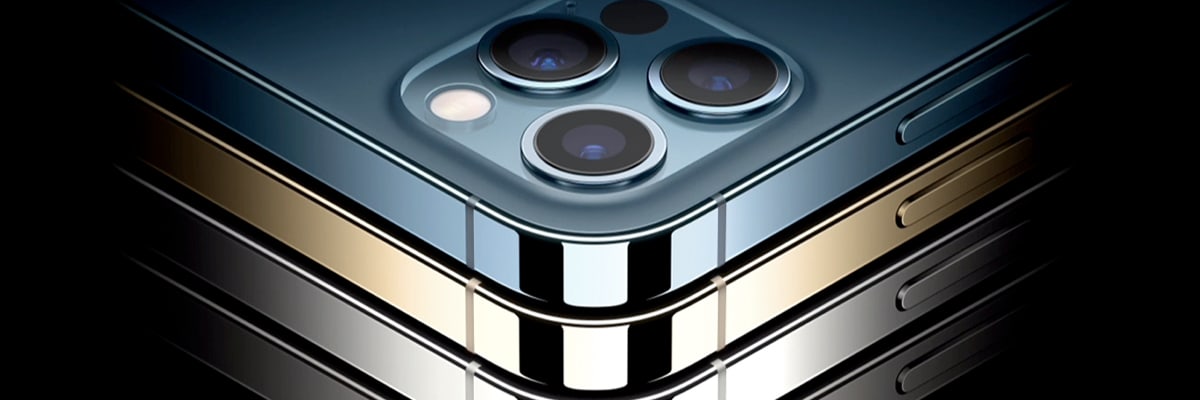
Return navigate_next
iPhone 13 Storage Options and What You Need to Know
November 17, 2021 *
Apple's latest and greatest iPhone has arrived. With it comes a bevy of new and exciting features. One of the most exciting features is the iPhone 13's incredible new camera, which can take cinema-quality videos and immersive photos.
However, with the new updates comes the need for ample storage space. How much is required to store a typical amount of music, movies, video clips, and photos? Of course, the amount of storage needed depends on the user and their needs.
Keep reading to learn about all the storage options available for the newest iPhone 13 and its variants.
Storage Amounts for Each Phone
While Android users can almost always add storage to their handsets with help from MicroSD card slots, that is not the case with the iPhone 13. Instead, Apple's devices require users to stick with the included storage option — or find a service such as iCloud or a third-party provider to provide more space. Thankfully, the average user shouldn't require more than what's already on the device.

All four iPhone 13 models (13, mini, Pro, and Pro Max) are available with 128GB, 256GB, and 512GB storage options. In addition, Pro and Pro Max customers also have a 1TB storage option.
How Much Storage Is Really Needed?
Consuming content is less about storage space and more about internet speed. However, creating and sharing content still requires significant storage space. After all, that 4K video or collection of photos needs to be stored somewhere.
For this reason, videophiles hoping to create breathtaking shots will want at least 256GB of storage space at a minimum. Amateur podcasters, music creators, phone photographers, and other creative types will also be well-advised to go with the 256GB model. For everyone else, the 128GB models should more than suffice.
The Cost of Extra iPhone 13 Storage
A $100 price bump greets shoppers looking to move from a 128GB to 256GB iPhone model. Not bad for double the storage. However, the next option doubles not only the storage size but also the price. The 512GB customers can expect to pay an additional $200.
It's a steep price — one that will, unfortunately, apply to a lot of users. On the other hand, if someone is routinely filling up their 256GB iPhone 13, the 512GB version will give them plenty of expanded storage. Since the iPhone 13 and iPhone 13 mini models don't get a 1TB storage option, many consumers will opt for the 512GB models.

Pro and Pro Max fans will have to pay $200 more for the 1TB models. However, this shouldn't be an issue for most shoppers, considering those willing to shell out $1300 for a phone shouldn't sneeze at an additional $200 to max out their investment.
iPhone 13 Cloud Storage Options
Some iPhone users demand a nearly unlimited amount of storage space — and Apple is more than happy to help. A free iCloud account offers 5GB of cloud storage space. For those needing more, iCloud+ may be the solution. Apple offers the below plans for copious amounts of cloud storage on an iPhone 13:
- $0.99/month for 50GB
- $2.99/month for 200GB
- $9.99/month for 2TB
These low prices make it tempting to pick up a 128GB iPhone model and rely mostly on cloud storage. However, paying $100 upfront to get a 256GB model doesn't seem like a good choice. If a customer uses the 200GB/month plan for more than two and a half years, the cost will equal the price of that $100 storage increase.
There are plenty of third-party cloud storage providers with similar fantastic deals. Below are just a few of the best options:
- Google One: 15GB free, $1.99/month for 100GB
- Dropbox: 2GB free, $9.99/month for 2TB with yearly billing
- Microsoft OneDrive: 5GB free, $1.99/month for 100GB

Ultimately, no one storage approach is right for everyone. Therefore, it's important to compare options and research to determine which approach is most convenient or cost-effective for a particular user or situation.
Upsie Extended Warranty Coverage for iPhones
Upsie can protect a variety of iPhones and other devices with extended warranties. Upsie protects smartphones from accidental damage, manufacturing defects, early wear, and other faults.
Upsie’s warranties are affordable and cost just $9.99 per month. For comprehensive yet affordable protection, choose Upsie.
Learn More About Smartphones:
* This article is over 6 months old and may or may not be updated.
